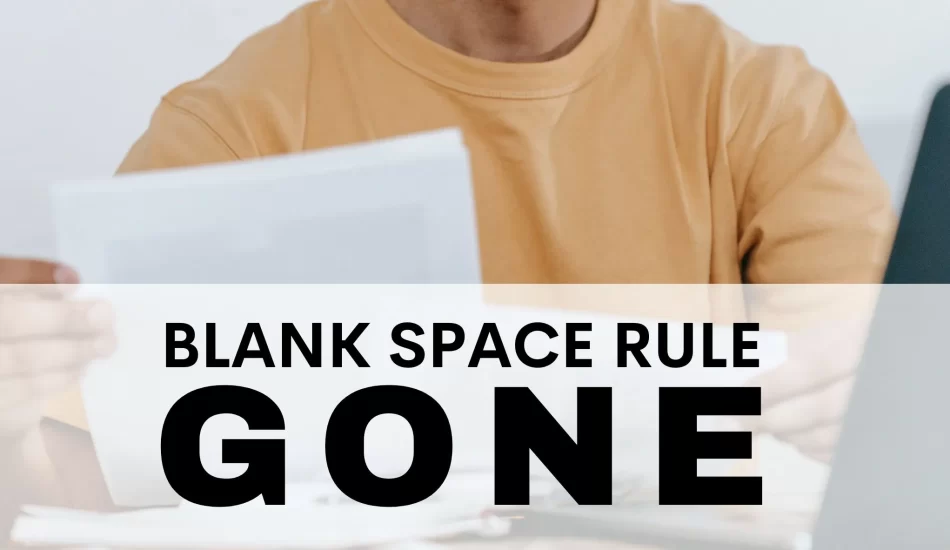USCIS Eliminates the Blank Space Rule on Immigration Forms

USCIS confirmed that it will no longer reject Form I-589, Form I-612, or Form I-918 if an applicant leaves a blank space. In 2019, USCIS changed the form rejection criteria for Forms I-589, I-612, and I-918 (asylum, waiver of foreign residence requirement, and petition for U-visa, respectively). From now on, USCIS will no longer reject these forms if an applicant leaves a blank space. Nevertheless, the agency cautions that blank spaces may create delays in processing an applicant’s case.
What Is the Blank Space Rule?
In 2019, USCIS issued a new policy alert regarding best practice for completing the I-918 (Petition for U Nonimmigrant Status). The alert stated that USCIS will begin rejecting forms that contain blank fields, unless the field specifically states that the question is optional. This was a new example of how particular the agency is becoming and how easily petitions can be denied or returned if you don’t follow the instructions carefully.
The USCIS website stated the following about that policy:
“We may reject your Form I-918 or your Form I-918 Supplement A if you leave a field blank, unless the field is optional. Optional fields include the safe mailing address as well as fields you should only complete if you answered yes to a previous question. You must provide a response to all other questions, even if the response is ‘none,’ ‘unknown,’ or ‘n/a.’ We will reject a Form I-918 or a Form I-918 Supplement A that has, for example, an empty field for middle name, for current immigration status, or for information pertaining to a spouse or child.”
In other words, if a potential immigrant left one non-optional box blank, such as by skipping a middle name instead of writing “NONE,” USCIS would not accept the form, per the policy.
Impacts of the Blank Space Rule
This policy affected USCIS forms such as the I-589 (Application for Asylum or Withholding of Removal). Around October 2019, USCIS added a similar policy alert to the I-589 page, explaining that any blank fields would result in a denied or returned application.
In following months, immigration attorneys began reporting that petitions were being returned due to “incompleteness,” but the only incomplete areas on the forms were items that didn’t apply to the clients. In the past, USCIS would not count this omission as “incomplete” and would understand blank fields to mean that the item didn’t apply.
USCIS Confirms Elimination of “Blank Space” Criteria
With the start of the Biden Administration came a flurry of reversing immigration regulations, and one of those changes related to the Blank Space rule.
On April 1, 2021, USCIS declared that it would revert back to the application rejection policy that existed prior to October 2019, which indicated that USCIS would no longer reject Form I-589, Form I-612, or Form I-918 if an applicant left a space on the application blank. This is a welcome change for applicants because the rule unfairly affected many humanitarian applicants.
Remember, though, USCIS may still reject your immigration application (or you may encounter processing delays) if you leave a required space blank, fail to respond to questions related to filing requirements, or omit any required initial evidence.
What If Some of the Questions on the Application Form Don’t Apply to Me?
Going forward, it will be important to always note “N/A,” “UNKNOWN,” or “NONE” in all such fields on immigration forms. Potential immigrants are encouraged to be careful and make sure every form is completely correct and filled, as USCIS is extremely particular and may reject forms over a small error. Assistance from an experienced immigration attorney can ensure that the entire process is done correctly.
Get Help with Your Petition from an Attorney
Passage Immigration Law will file your application for you. We understand that immigration matters are challenging, and that incorrectly-filed documents can incur huge, non-refundable expenses and possibly delay your case by months, if not years. In some cases, denial of an application can even lead to deportation. When you’re ready to begin filing your immigration forms, we’ll file, review, and guide you throughout the application process to help you complete it smoothly.
If you’re having trouble completing and filing your forms or need assistance bringing your family over to the United States via an immigrant visa, consider speaking with one of our qualified immigration attorneys to guide you through the process.
Our expert immigration lawyers will offer you necessary support, representation, and legal guidance you can trust as you seek to reunite with your family. Get in touch today for quality immigration services and assistance. Call to schedule an appointment at (503) 427-8243. Or, you can schedule a consultation here.
